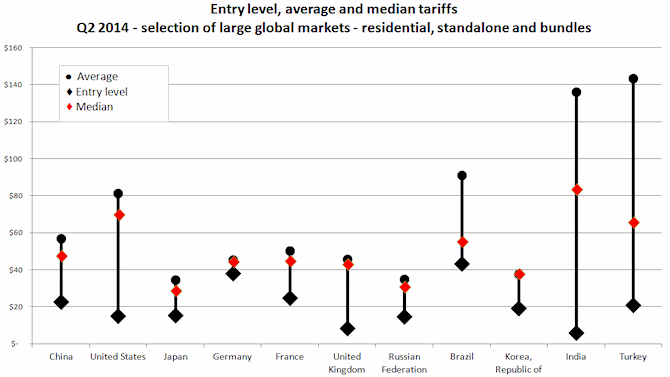UK Consumers Benefit from Balanced and Affordable Broadband
The United Kingdom has one of the world’s most aggressively competitive broadband ISP markets and a new report from Point Topic helps to put this into some context by showing how we compare with other major countries and the variance of our tariffs. In terms of entry-level tariffs, we are ranked 7th in the world, albeit behind some odd front runners including Sudan, India and Belarus etc.
The report recognises that comparing tariffs between markets is fraught with difficulties due to the often significant differences between service aspects like network coverage, value-added extras, line rental, data allowances, service speeds and the list goes on.
Advertisement
As a result Point Topic simply focuses on subscriptions from the largest operator in each market in terms of subscribers (e.g. BT for the UK), which is meant to represent the commonest and most accessible tariff using Purchasing Power Parity (i.e. adjusting the local currency and exchange rate to make the buying power of $1 (PPP) in country A equal to $1 (PPP) in country B).
The findings for 82 countries can be found in their full report, although the following chart uses a batch of selected markets from across the sector to help illustrate the cost of entry-level, average and median tariffs. Take note that £1 GBP currently equates to around $1.7 USD.

The decision to use the biggest operator as a guide means that the United Kingdom’s entry-level tariffs above aren’t as cheap as they could be. For example, BT’s entry-level broadband package is currently £13 per month or £5 per month for the first 12 months with a discount. By comparison Direct Save Telecom, POP Telecom, Primus Saver, TalkTalk and others all offer both significantly cheaper (usually less than £5 per month) and often more flexible options, albeit with different pros and cons in other areas (e.g. wifi hotspots, online storage, data usage etc.).
Never the less the gap between our entry-level, average and median tariffs is much less pronounced than in other countries, which is a good thing. For example, India might offer cheapest entry-level solutions but their actual average tariffs are still massively more expensive.
Advertisement
India’s national state-owned operator is BSNL and it offers an utterly bewildering array of monthly and even pre-paid fixed line broadband tariffs, which make use of services like first generation ADSL and even modern FTTH. This helps to explain the big differences because pre-paid ADSL users don’t get a lot of speed or data usage, but pay a lot more and you could have unlimited.
Oliver Johnson, CEO of Point Topic, said:
“India is interesting in broadband terms. It’s a market with huge potential which is only just starting to be realised. The entry level tariff is suitably low compared to other markets but the spread of options and value of the median suggest that a typical consumer has a hard time affording more bandwidth. Something for the operators to digest and perhaps for the government to understand.
Tariffs are key to all broadband markets going forward. Many mature markets are now at the stage where the non-adopters need to be addressed. One of the commonest barriers to broadband adoption is the cost not only of the subscription itself but particularly the total cost of ownership in year one which includes the kit you need to get online with as well.”
Meanwhile the United Kingdom has benefitted, at least in terms of affordability and choice, from having an aggressively competitive broadband market that’s largely supported by LLU / Local Loop Unbundling (ISPs taking control of broadband lines away from BT). But at present LLU is only a benefit to older-style copper ADSL2+ lines and not the more modern FTTC.
Equally some complain that this competition, while helping to develop a more affordable service, may have also made it more difficult to invest in future solutions like pure fibre optic connectivity (FTTH/P).
Mark is a professional technology writer, IT consultant and computer engineer from Dorset (England), he also founded ISPreview in 1999 and enjoys analysing the latest telecoms and broadband developments. Find me on X (Twitter), Mastodon, Facebook, BlueSky, Threads.net and Linkedin.
« Shropshire Unable to Solve Broadband Funding Woes via Growth Fund

















































Comments are closed